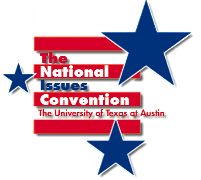

The National Issues Convention was held in Austin, Texas, where 600
Americans from all walks of life came to talk about what ails the
nation and how to fix it. From January 18 through 21, the focus was
on coming to terms with the issues and interviewing the presidential
candidates who attended. The convention was the brainchild of University
of Texas Political Science Professor Jim Fishkin, and included Fishkin's
deliberative opinion poll, which provided a snapshot of how people
felt about the issues after they had a chance to think and talk about
them. Reporter John Biewen followed the convention for Democracy
Place Radio. What follows are reports from each day of the convention.
 Setting the Scene
Setting the Scene
 Day 1
Day 1
 Day 2
Day 2
 Day 3
Day 3
 Day 4
Day 4
 Homeward Bound
Homeward Bound
 The Results are In
The Results are In
Setting the Scene
Click on a radio to hear a sound clip!
 RealAudio 1.0
RealAudio 1.0
 RealAudio 2.0
RealAudio 2.0
 AU format; 3 mins.
AU format; 3 mins.
 Day 1
Day 1
Reporter John Biewen interviews National Issues Convention Director Professor Jim Fishkin for Democracy Place.
 RealAudio 1.0
RealAudio 1.0
 RealAudio 2.0
RealAudio 2.0
 AU format; 4 mins.
AU format; 4 mins.
 Day 2
Day 2
About 475 randomly picked Americans spent the day searching for answers to the nation's problems at the first-of-its-kind National Issues Convention in Austin, Texas. As John Biewen reports for Democracy Place, delegates seemed to gain an appreciation for the complexities that policymakers face.
 RealAudio 1.0
RealAudio 1.0
 RealAudio 2.0
RealAudio 2.0
 AU format; 4 mins.
AU format; 4 mins.
It's unclear what impact the National Issues Convention will have on the Presidential election campaign, but one researcher says the experience is likely to change the 476 convention delegates -- especially those who've come to Austin with little background or interest in politics. John Gastil is Research Manager at the University of New Mexico's Institute for Public Policy. He told reporter John Biewen that he wrote his Ph.D dissertation on the effects of participation in National Issues Forums. (Since 1982, the National Issues Forums have run local, short-term public policy forums roughly similar to the National Issues Convention. The NIC moderators are trained by the NIF.)
 RealAudio 1.0
RealAudio 1.0
 RealAudio 2.0
RealAudio 2.0
 AU format; 4 mins.
AU format; 4 mins.
 Day 3
Day 3
National Issues Convention delegates are being asked to consider three broad issues: the family, America's role in the post-Cold War world, and the economy. But one of the three issues seems to be close to the surface almost all the time, even in sessions devoted to the other two. John Biewen, for Democracy Place, reports.
 RealAudio 1.0
RealAudio 1.0
 RealAudio 2.0
RealAudio 2.0
 AU format; 4.5 mins.
AU format; 4.5 mins.
 Day 4
Day 4
Four GOP presidential candidates faced more than 475 ordinary citizens--a population sample that the event organizer called "America in one room"--at the National Issues Convention in Austin, Texas, Saturday night. John Biewen reports for Democracy Place.
 RealAudio 1.0
RealAudio 1.0
 RealAudio 2.0
RealAudio 2.0
 AU format; 4.5 mins.
AU format; 4.5 mins.
Vice President Al Gore met with delegates to the National Issues Convention today, answering their questions on the economy, the family and foreign affairs. Gore expressed enthusiasm for the "deliberative poll" that forms the centerpiece of the convention. In fact, he seemed unable to wait for the results of the poll. John Biewen reports for Democracy Place.
 RealAudio 1.0
RealAudio 1.0
 RealAudio 2.0
RealAudio 2.0
 AU format; 4.5 mins.
AU format; 4.5 mins.
In an interview at the National Issues Convention in Austin, Fouhy told reporter John Biewen that Civic Journalism is aimed at reconnecting reporters with ordinary citizens.
 RealAudio 1.0
RealAudio 1.0
 RealAudio 2.0
RealAudio 2.0
 Au format; 10
mins.
Au format; 10
mins.
 RealAudio 1.0
RealAudio 1.0
 RealAudio 2.0
RealAudio 2.0
 Au format; 10
mins.
Au format; 10
mins.
 RealAudio 1.0
RealAudio 1.0
 RealAudio 2.0
RealAudio 2.0
 Au format; 4
mins.
Au format; 4
mins.
 Previous Weeks'
Programs
Previous Weeks'
Programs
[ TV | Newspapers | Press Club | Polls | Meet the Candidates | Community Center | Let's Talk]